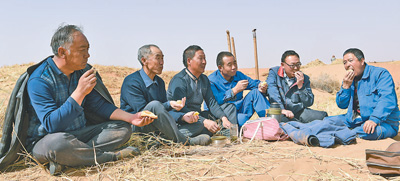


He Zhongqiang, Guo Wangang, Shi Yinshan, Luo Xingquan, Cheng Shengxue and Wang Zhipeng (from left to right) have lunch during a break at Heigangsha, a sand dune in Gulang county, northwest China’s Gansu province, March 26, 2019. (Photo: Fan Peishen/Xinhua)
In the 1970s, Babusha, an enormous sand dune on the southern edge of the Tengger desert, gradually encroached south, threatening the social and economic development of Gulang county in northwest China’s Gansu province and the livelihoods of those who lived there.
In 1981, 56-year-old Shi Man took it upon himself to reverse the desertification in Gulang. Before long, another five villagers over the age of 50 joined the campaign. Rather than bow down to the advancing desert, the six local farmers decided to plant trees to help fix the sand in place and curb the desertification.
More than 10 years later, thanks to the efforts of all six farmers, 28-square kilometers of the desert have been replaced with greenery.
Despite the difficulty of fighting against the sand, the second and third generations picked up the responsibility of their fathers.
After almost four decades, the combined efforts of three generations have created 145 square kilometers of trees and 250 square kilometers of grass in Gulang, turning the once-threatened county into a green corridor.
Gulang has now developed into a vibrant forest farm which is also helping local people make money.
 Fire brigade in Shanghai holds group wedding
Fire brigade in Shanghai holds group wedding Tourists enjoy ice sculptures in Datan Town, north China
Tourists enjoy ice sculptures in Datan Town, north China Sunset scenery of Dayan Pagoda in Xi'an
Sunset scenery of Dayan Pagoda in Xi'an Tourists have fun at scenic spot in Nanlong Town, NW China
Tourists have fun at scenic spot in Nanlong Town, NW China Harbin attracts tourists by making best use of ice in winter
Harbin attracts tourists by making best use of ice in winter In pics: FIS Alpine Ski Women's World Cup Slalom
In pics: FIS Alpine Ski Women's World Cup Slalom Black-necked cranes rest at reservoir in Lhunzhub County, Lhasa
Black-necked cranes rest at reservoir in Lhunzhub County, Lhasa China's FAST telescope will be available to foreign scientists in April
China's FAST telescope will be available to foreign scientists in April "She power" plays indispensable role in poverty alleviation
"She power" plays indispensable role in poverty alleviation Top 10 world news events of People's Daily in 2020
Top 10 world news events of People's Daily in 2020 Top 10 China news events of People's Daily in 2020
Top 10 China news events of People's Daily in 2020 Top 10 media buzzwords of 2020
Top 10 media buzzwords of 2020 Year-ender:10 major tourism stories of 2020
Year-ender:10 major tourism stories of 2020 No interference in Venezuelan issues
No interference in Venezuelan issues
 Biz prepares for trade spat
Biz prepares for trade spat
 Broadcasting Continent
Broadcasting Continent Australia wins Chinese CEOs as US loses
Australia wins Chinese CEOs as US loses